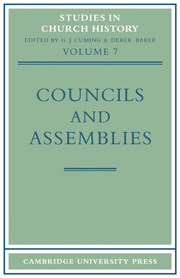Book contents
- Frontmatter
- Preface
- Contents
- Contributors
- Abbreviations
- Public welfare and social legislation in the early medieval councils (Presidential Address)
- National synods, kingship as office, and royal anointing: an early medieval syndrome
- The case of Berengar of Tours
- Ecclesiastica and Regalia: Papal investiture policy from the Council of Guastalla to the First Lateran Council, 1106–23
- Viri religiosi and the York election dispute
- Councils and synods in thirteenth-century Castile and Aragon
- The Byzantine reaction to the Second Council of Lyons, 1274
- The Council of London of 1342
- Education in English ecclesiastical legislation of the later Middle Ages
- The representation of the universitas fidelium in the councils of the conciliar period
- Nicholas Ryssheton and the Council of Pisa, 1409
- The condemnation of John Wyclif at the Council of Constance
- Some aspects of English representation at the Council of Basle
- The Council of Basle and the Second Vatican Council
- The Colloquies between Catholics and Protestants, 1539–41
- King James I's call for an ecumenical council
- John Hales and the Synod of Dort
- Assembly and Association in Dissent, 1689–1831
- The Convocation of 1710: an Anglican attempt at counter-revolution
- Laymen in synod: an aspect of the beginnings of synodical government in South Africa
- The First Vatican Council
- Kikuyu and Edinburgh: the interaction of attitudes to two conferences
National synods, kingship as office, and royal anointing: an early medieval syndrome
Published online by Cambridge University Press: 12 March 2010
- Frontmatter
- Preface
- Contents
- Contributors
- Abbreviations
- Public welfare and social legislation in the early medieval councils (Presidential Address)
- National synods, kingship as office, and royal anointing: an early medieval syndrome
- The case of Berengar of Tours
- Ecclesiastica and Regalia: Papal investiture policy from the Council of Guastalla to the First Lateran Council, 1106–23
- Viri religiosi and the York election dispute
- Councils and synods in thirteenth-century Castile and Aragon
- The Byzantine reaction to the Second Council of Lyons, 1274
- The Council of London of 1342
- Education in English ecclesiastical legislation of the later Middle Ages
- The representation of the universitas fidelium in the councils of the conciliar period
- Nicholas Ryssheton and the Council of Pisa, 1409
- The condemnation of John Wyclif at the Council of Constance
- Some aspects of English representation at the Council of Basle
- The Council of Basle and the Second Vatican Council
- The Colloquies between Catholics and Protestants, 1539–41
- King James I's call for an ecumenical council
- John Hales and the Synod of Dort
- Assembly and Association in Dissent, 1689–1831
- The Convocation of 1710: an Anglican attempt at counter-revolution
- Laymen in synod: an aspect of the beginnings of synodical government in South Africa
- The First Vatican Council
- Kikuyu and Edinburgh: the interaction of attitudes to two conferences
Summary
Professor Gabriel Le Bras, a great pioneer in the field of historical sociology, has spoken of the early medieval II Church in a bizarre but effective metaphor as ‘a dismembered body striving to reunite itself’. The essential task of the hierarchy within each national Church was one of coordination—by means of law, doctrine, and the standardization of worship. In the fragmented world of the barbarian kingdoms, the distinctive feature of each episcopate was its ideology of cohesion, the more ardently propounded when social crisis was particularly acute, as in the seventh-century Visigothic kingdom, or the wartorn West Francia of the 830s and 840s. This ideology was, moreover, often intimately associated with movements of monastic reform. Its influence penetrated down into the rural base of society through episcopal visitations, preaching, and provincial councils. To trace all the elements in these complex processes of interaction and change would encompass that much-needed sociology of the early medieval Church which Max Weber did not live to write and no scholar has yet produced. In this paper, as its title implies, my very limited objective is to isolate and examine certain recurrent phenomena and to point to some hitherto unnoticed connections.
Some historians have depicted the bishops of the early Middle Ages as secular magnates wearing different hats, and thus have seen their activities as one among other forms of Adelsherrschaft. It is true that bishops were drawn very largely from noble families. But equally significant is the fact that they were royal nominees, and in the periods I shall be considering, kings preferred to seek their bishops in the monasteries.
- Type
- Chapter
- Information
- Councils and Assemblies , pp. 41 - 60Publisher: Cambridge University PressPrint publication year: 1970



